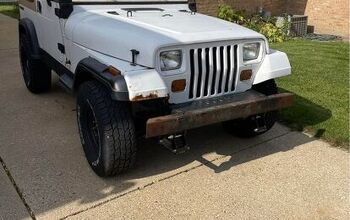Bailout Watch 417: Why We Should Bail Out Detroit, Again
This Jackson Citizen Patriot editorial sums up Detroit’s pro-bailout stance perfectly.
A bailout-weary public has every right to be skeptical of General Motors and Chrysler. The price tag to keep these pillars of American automaking alive soon will reach $39 billion. That comes to $127 for every U.S. citizen.
The expensive reality is that the federal government will—and should—lend more money to these companies while demanding progress on the road to profitability.
The alternative—the loss of hundreds of thousands of U.S. jobs—is too much to fathom today.
GM and Chrysler are asking to borrow $21.6 billion on top of $17.4 billion they received in December. Think of it as Bailout 2.0. As the public’s patience wears thin, it also might be the last time they could get taxpayer help.
Critics can slam GM, Chrysler and Ford (which has not asked for federal help) for years of bad decisions, but they ultimately are victims of the economy’s rare condition.
Chrysler’s CEO predicts that sales of new vehicles in the U.S. will fall to a 40-year low of 10.1 million this year. The still-tight credit market means these companies are not going to get bank loans to cover their losses.
If even one domestic automaker folds, there would be a domino effect that would gut the economy. One company’s shutdown could start a cascade of misery that would claim parts suppliers, dealerships and even all of the Detroit Three. One alternative, bankruptcy, still could have the same effect.
A local economy that leans heavily on manufacturing (and has 11 percent unemployment) can hardly afford that. Neither can the national economy, which now has 5 million people unable to find work.
None of this means the federal government should give GM or Chrysler a blank check. These companies have to become profitable. That is why the two already had to hammer out fresh concessions from the United Auto Workers. That is why GM is spinning off or closing Saab, Saturn and Hummer. That is why both automakers are planning to shed more jobs.
The presidential task force that is reviewing these loan requests met for the first time Friday. It has a duty to make sure the automakers’ plans are sound, that GM and Chrysler indeed can make money again in the next year or two. Where possible, the task force also should push them to retain jobs on American soil.
In different times, these loans would be excessive. When private companies do not succeed, they fail. That is a cornerstone of the free market.
Still, these are not typical times. Right or wrong, the federal government is making a much more expensive commitment to propping up the economy in hopes of avoiding the next Great Depression. The auto companies are not asking for a handout but for loans that would be repaid.
Unfortunately, despite huge infusions of cash, the financial system in this country is still paralyzed, unable or unwilling to lend money. That is why more federal loans are needed for GM and Chrysler. Federal help should spare the economy from suffering a job loss that, today, is too much to absorb.
More by Robert Farago
Latest Car Reviews
Read moreLatest Product Reviews
Read moreRecent Comments
- 28-Cars-Later Say it ain't so, so reboot #6* isn't going to change anything?[list=1][*]V4-6-8 and High "Tech" 4100.[/*][*]Front wheel drive sooooo modern.[/*][*]NOrthSTARt.[/*][*]Catera wooooo.[/*][*]ATS all the things.[/*][*]We're *are* your daddy's Tesla. [/*][/list=1]
- MaintenanceCosts Can I have the hybrid powertrains and packaging of the RAV4 Hybrid or Prime with the interior materials, design, and build quality of the Mazda?
- ToolGuy I have 2 podcasts to listen to before commenting, stop rushing my homework.
- ToolGuy Please allow me to listen to the podcast before commenting. (This is the way my mind works, please forgive me.)
- ToolGuy My ancient sedan (19 years lol) matches the turbo Mazda 0-60 (on paper) while delivering better highway fuel economy, so let's just say I don't see a compelling reason to 'upgrade' and by the way HOW HAVE ICE POWERTRAIN ENGINEERS BEEN SPENDING THEIR TIME never mind I think I know. 😉


































Comments
Join the conversation
McDoughnut You don't get it. THE F22 WILL NEVER BE EXPORTED - TO ANY COUNTRY. PERIOD. The F-35 is the export model Lockheed is building. I support the F35 program for the A model and the C-model (navalized) but the B-model is a waste of money. Vertical Takeoff and Landing for a plane designed to carry so few munitions is a waste of money. We'd be better off, upgrading Harrier II.
Flashpoint said: And yes, the loss (sudden shock) of millions of jobs would be disastrous. The auto industry and the connected suppliers are a huge part of America’s payroll and taxable income. That's very laughable. Sure I want to preserve jobs, too. But why preserve GM jobs? I live in Canada. GM has asked the Canadian government for 7 billion to keep 7000 jobs. That's 1 million per job. Even if it's the right thing to save jobs, don't you think it's not worth it to save these GM jobs? Why not save some other jobs, such as Walmart cashier jobs, at $50k each? That way we can save 140,000 jobs, instead of 7,000 jobs.